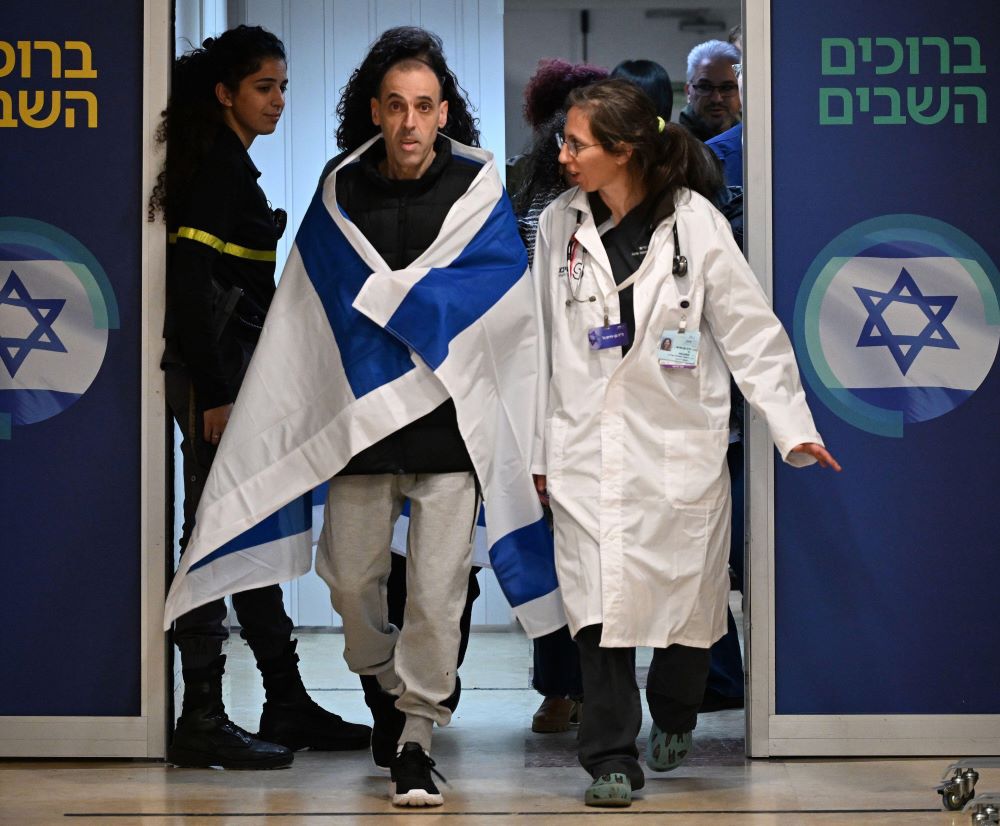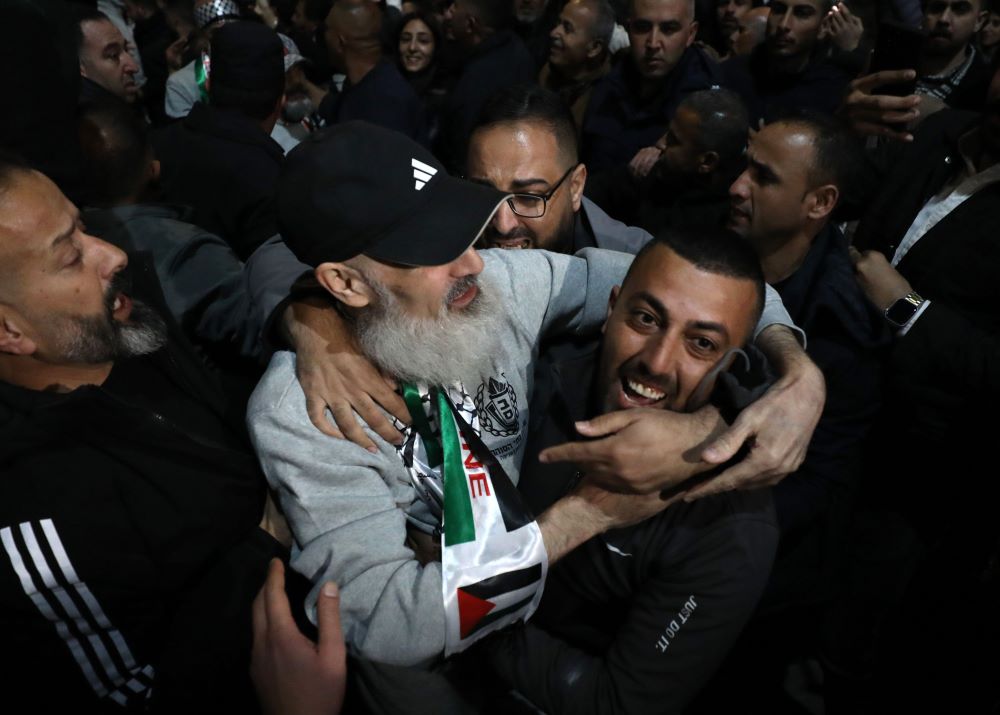Community Relations In Fragile Place As Gaza Ceasefire Holds For Now
Community leaders have said community cohesion remains "fragile". (Alamy)
5 min read
Community relations in the UK remain in a "fragile" state, according to leaders on the ground, amid concern that the ceasefire between Israel and Hamas could collapse.
The ceasefire, which began on 19 January, was agreed under the terms of a phased release of Israeli hostages being held in Gaza, and Palestinian prisoners being held in Israel.
On Tuesday, Israeli prime minister Benjamin Netanyahu said fighting would resume if the remaining hostages were not released by noon on Saturday. Hamas had suspended the planned release, accusing Israel of breaching the terms of the ceasefire.
"If Hamas does not return our hostages by Saturday noon, the ceasefire will be terminated, and the IDF will return to intense fighting until Hamas is finally defeated," he said.
On Friday morning, Hamas confirmed that it would release three hostages on Saturday. However, the situation remains fraught.
On 7 October 2023, Hamas carried out a large-scale terrorist attack on southern Israel, killing more than 1,000 Israelis and kidnapping hundreds. The resulting war has led to more than 40,000 deaths in Gaza.
The conflict in the Middle East has resulted in rising tensions in the UK, with sharp spikes in antisemitism and Islamophobia. Earlier this week, the landmark Drumlanrig Accords between Muslim and Jewish faith leaders were signed at Spencer House in the presence of King Charles in a bid to strengthen interfaith relations.
Julie Siddiqi, interfaith consultant and cohesion campaigner, told PoliticsHome the intercommunal situation in the UK remained "fragile".
"Everything is still very raw. Even if we're using the language of ceasefire, things are still very divisive here," said Siddiqi.
 Eli Sharabi is reunited with his brother Sharon and his sisters Osnat and Hila at Sheba Medical Center after he was released by Hamas. (Alamy)
Eli Sharabi is reunited with his brother Sharon and his sisters Osnat and Hila at Sheba Medical Center after he was released by Hamas. (Alamy)
"I've worked in community and interfaith relations, cohesion stuff, for 20-odd years and I've never seen anything affect people like that has affected people here."
Siddiqi said disinformation, combined with biased or selective information, had created a polarising affect among communities in the UK and that tensions could spike again if the ceasefire does not hold.
"Part of the problem is that people are often very separate, certainly Jews and Muslims, even in geography. There's a lot of people who just don't meet each other, and therefore they just listen to whatever rhetoric they hear, and then just go with that," said Siddiqi.
Siddiqi said the main word to describe the situation was "fragile", telling PoliticsHome that rebuilding interfaith relations would be a "long-term game".
"We're going to need to be in it for the long term to really rebuild trust and get new people involved," said Siddiqi.
"It feels to me still quite bleak in that sense, but I know there's a lot of goodwill, lots of people — Muslims, Jews, others — here to make sure that it doesn't fully sort of fall apart."
Phil Rosenberg, president of the Board of Deputies of British Jews, told PoliticsHome the Hamas attack and subsequent conflict "have put a particular strain on Muslim-Jewish relations".
"At one point, there was a 500 per cent rise in both antisemitism and anti-Muslim hatred," said Rosenberg.
However, the president said there have "been points of light" in the growing amount of interfaith and inter-communal work between Jewish and Muslim groups in the UK. This, he said, included the Drumlanrig Accords, which "chart a new path forward in Muslim-Jewish relations".
"We hope that the hostage-ceasefire deal continues to hold; that all the hostages are released; that aid continues to get into Gaza; that the rebuilding of Gaza for its people can begin; and that we can see work towards a lasting resolution to the Israeli-Palestinian conflict and the expansion of the Abraham Accords," said Rosenberg.
"However, while we will continue to call for these things, very little is in our hands.
"That’s why these recent steps by UK Jewish and Muslim leaders to forge a better Britain together, whatever happens in the Middle East, is very welcome."
Sunder Katwala, director of British Future, told PoliticsHome that the conflict had tested community tensions because it feels "intense and personal" to certain communities.
 People welcome a released Palestinian prisoner in the West Bank city of Ramallah. (Alamy)
People welcome a released Palestinian prisoner in the West Bank city of Ramallah. (Alamy)
"That is particularly people who are Jewish and by people who are Muslim," said Katwala.
"That is something that, in different ways, could affect not just their view of the world events, but their actual experience of their daily lives.
"That sense of what's safe, what isn't safe; [because] what's going on is noise often in the background to most people."
Katwala said while "some of the heat and intensity" has abated compared to where community relations were in November or last spring, should the ceasefire collapse, "there's be a real fear of flaring up again".
Danny Stone, chief executive of the Antisemitism Policy Trust, told PoliticsHome that while progress was being made in inter-communal relations, the situation was still difficult and that the ceasefire collapsing or "anything that rolls back moves towards peace, moves towards reconciliation" would risk inflaming the situation.
"There was the Accord signed between Jewish and Muslim leaders that met with the king, and we've got parliamentary inquiries into community cohesion, for example.
"There are good things, progress, being made in that respect," said Stone.
"But as ever, it's also a bad news story insofar as this week we saw that there was the second highest ever number of antisemitic incidents recorded by the Community Security Trust, and what it proves is that the conflict has a direct impact on antisemitic incidents in the UK."
Imam Qari Asim, an interfaith expert, said relations between Muslim and Jewish communities had been "limited in the last 16 months" and that the collapse of the ceasefire would "further raise tensions and intensify vulnerability, suspicion, and mistrust between Jewish and Muslim communities".
"The Drumlanrig Accords is an attempt to take a courageous stance by the faith leadership in both traditions, to say that we should not allow the hatred and suspicion to affect our community, relations in this country."
"The future in this country does not have to be plagued with fear, mistrust and hurt," he added.
"This accord provides a framework for engagement and provides the beacon of hope and peace for coming generations."
